#mytips
Photo



{ 2020 quarantine challenge :: day 1 }
how i plan my days + my “study” schedule
basically a wEek in the LiFe of a bErkEley (graduating) senior + deep dive into how i plan and remember each day i spend in quarantine while still attending ~*zoom university*~ !! yeet
• an introduction •
because i spend a lot of time online, i find that my google calendar is the quickest and easiest way for me to manage my time !! though i use my planner / bullet journal on a daily basis to manage my TODOs (+ to journal), i find that gcal gives me the best flexibility and efficiency when it comes to actually planning out and scheduling my day!
the fact that i can check it on my phone while i’m on the go (hurray @ integration across devices) also helped a lot when i was still on-campus and didn’t have the ability to take out my planner from my backpack. and even now in quarantine, when i don’t want to be on my laptop, i can just quickly glance at whatever mobile device to see what i need to do next!
but ya, here comes a (very long) breakdown of how i use this system to keep my days goin’ ᕕ( ᐛ )ᕗ
(1) color coding + customizations
i am, as many of my friends have pointed out, an aggressive color-coder 👀 i just really like to be able to look at my calendar at the start of the day and have a good idea of what kind of things i need to take care of! to go through my separate calendars/categories in (reverse) order:
bright red (tests) || to remind me when my exams are, not that i’d forget 🤪
light gray (school) || all things school related! classes, student orgs, meetings, etc.
bright blue (teaching duties) || class i’m a TA for
dark blue (csm, aka more teaching) || student org i’m a part of
orange (exercise) || everything health + wellness related
yellow (events) || all my non-school related Events™ that i schedule (ie. socials, calls with friends, anything rly a step from a ~regular daily activity~)
maroon (chinese hw) || hw + projects assignment due dates
light green (daily) || my day-to-day activities
i like having separate categories correspond to colors that i associate with them too! bright red for alarm (exams lmao), light gray for school (muted, in the background hah), light green for daily (because it’s also more muted/in the background, but still prominent enough that i’ll notice it heh), and yellow for fun! events! (because it’s warm and cheerful).
(2) separate calendars customization
most of my colors correspond to separate calendars, partially because it’s faster to create a color-coded event if you have it in a separate calendar! at least, it is on desktop heh. and also! i find that it’s easier to customize more things on an individual calendar basis:
notifications: each calendar/category has different notification settings. my “tests” calendar reminds me 1 week + 2 weeks in advance, "school” is just 10 min. in advance, whereas “daily” has no reminders at all! i customized these settings according to how often i felt like i needed help remember when certain things were.
colors (lol): in case it wasn’t obvious, colors matter a lot to me LOL. you can choose your own custom colors if it’s a separate calendar, and you can only use the google calendar default colors if you’re “recoloring” an existing calendar event.
display: it’s nice to also be able to toggle on/off various calendars!
but ya those are the main reasons why i use separate calendars instead of just recoloring the events in a single calendar!
(3) creating structure
because as a college student we usually have a good amount of free/flexible time, i find creating structure to be very important for me — and this is true for almost all students now during times in quarantine, when everything is kind of up in the air / go-at-your-own-pace.
i feel like the nice thing about being a student is that we usually have repeating events, so i like to set recurring calendar events to help create a regular structure on a weekly basis. usually i sit down at the start of the semester with my schedule/syllabi and just add everything in one go.
and now in quarantine, even if you aren’t given a schedule to follow and if working with a schedule is helpful for you, then creating that structure yourself is a nice way of adding consistency and stability back into your life :’)
the first calendar photo is how my gcal looks at the start of the week before any planning happens!
(4) time blocking
i once read that time blocking (re: setting aside chunks of time for a single task) is optimal for efficiency / mental energy. typically it’s easier for people to focus on one task for an extended period of time (with breaks) than it is to multitask or context-switch super often.
i also find that sometimes my schedule has weird gaps in it, due to the way my mandatory events are set up. so time blocking has helped me determine when i can get certain things done, or if i just wanna take a break in my awkward 30 min. gap between meetings!
the way that i time block is usually:
write in my planner all my (intended) TODOs + goals for the day
look at my calendar for the day + start planning when i’ll do which TODOs using my (default) calendar DAILY
i only plan the day of in my google calendar, because things change and who knows how much i’ll actually get done ¯\ _(ツ)_/¯ also it’s a relaxing thing for me to sit there and journal/plan before i get started with my day hehe. a morning ritual, in a sense!
it also makes it a lot less stressful to look at my calendar, because i only ever look at the current day i’m on and what to do on that particular day. the interface of google calendar makes it really easy for me to drag events around and update time estimates as the day progresses too!
i also find it very useful for me to see what it’s actually possible to get done in my day, since sometimes my TODO list can be a lil’ too ambitious (oops 😋)
(5) daily logs + journaling
and lastly, i have some friends who have completely forgone their gcals since things moved online, but i have actually leaned on it even more —
one reason is all the stuff i listed above (structure, efficiency, also just habit at this point haha). but another really important reason to me is the logging that my gcal calendar creates! since i just spend every day at home, i feel like days were passing by a lot more quickly + in a blur, and by “writing down” everything i did/planned to do on gcal, i’m able to remember what i’ve been doing during these really interesting times o:
it helps me when i journal at the end of the day / the next morning, because i just look back at my gcal to reference what things i did, and then journal about how i felt about those activities.
• the ending •
aaaaand that’s it!
my super long documentation on how i’ve managed my time these past few years in college + in this 2020 quarantine era :’)
#studyblr#2020 quarantine challenge#study schedule#plan#planning#planning tips#college planning#google calendar#collegeblr#college#uc berkeley#berkeley#zoom university#lol#mytips#studytips#myhoneststudyblr#studytomorrow#studylustre#odysseyi#stillstudies#lookstudyblr#tbhstudying#mine#einstein
191 notes
·
View notes
Text
List of free IG Workouts
Hi! I’ve seen people asking questions about workouts on a couple blogs and since I have a lot of time atm I thought I would share my favs if anyone is wondering.
Booty workouts:
Tammy Hembrow
@ squats
The Booty King
General Workout (all types)
Sami Clarke
It’s Kim Glass
Meghan Grubb
Running/triathlon/swimming
Sarah Canney
Ellen Janssen
At Home Workouts I’ve purchased
Lauren Gliesberg (i LOVE her pelvic floor program even if youve never had a baby, great if you accidentally pee when you jump AND strengthens those kegels baby for sexxxx.)
BBG at home PDF
Mental/ Emotional health
Rising women
Create the love
young pueblo
Quotes by Christie
14 notes
·
View notes
Text
Before you scroll down this blog, it’s important to me to explain some things…
This blog is not made to give you anxiety.
I know it can seem dumb, but fitspo and studyspo community can actually be really stressful. I know it because it gave me anxiety some time ago. I wanted to succeed so bad, I wanted to have a perfect university journey, a perfect health journey, and I went on tumblr everyday to motivate me. The problem is, at first it was motivating, but it then made me really anxious. I was constantly comparing…
Studying, working out and being motivated is not about aesthetics. It’s not about tumblr posts. It’s not about beautiful notebooks, fancy sportswear and colorful meals.
Improving is a very personal journey. It’s great to share it with the community, and I love doing that today. It’s great to share tips, to see how the others do, to find help when you have troubles with something.
But it shouldn’t give you anxiety. Never. Running or visiting fitblr or studyblr shouldn’t be more important than actually learning things and going forward.
One more thing about studying : succeeding in life is not all about school, college and studying. Believe me. Studying shouldn’t be all of your life. You have to fail, you have not to understand, you have to change path, you have to struggle, you have to learn the hard way, you have not to know, you have to live things outside of school.
Having good grades does not mean you’re happy. At all. Don’t hang on to that. If it makes your neighbour happy, it doesn’t mean it will work for you. Don’t get trapped by the pretty pictures and the always inspiring speeches : happiness is so much more than that.
Go out and live things !
Share them on social media, on tumblr if you want, get inspired on the internet, but don’t get stuck to it.
I post here because it keeps me motivated and because I think some of my tips can actually help you in your studies. When I’m not in the mood, I just don’t post. Some days I just feel more like going for a walk, going out with friends, reading a good book, going to a movie, to the theater… Those are real things you’re living. Don’t ever forget it.
Plus, it’s really important not to forget that studyspo is not the actual reflection of the reality of learning things… Some of us go to college, some of us are student in high schools, some of us don’t even study anymore but like to be a part of this community. But we have to remember that many many people are learning manual professions (for example) and don’t actually need to study the way we do. It doesn’t mean they’re less legitimate, but it means we have to stop thinking this way of learning is ideal : it is not. It’s great for some people and I’m glad if it’s great for you, but it’s completely ineffective for some others. Each and everyone of us have a different way to learn. If it goes by studying in books, great ! Welcome here, you’ll learn so much. If it doesn’t go by studying in books, great ! I hope you’re happy in your school or your job.
Also, in many countries, studying is a privilege. Please, never forget that.
Thanks for reading me. I’m happy I could share that point of view with you.
Don’t hesitate to message me !
Love
C.
8 notes
·
View notes
Text
Things I’ve Discovered While Editing (And How They Can Save You!)
I’ve been editing my book for some time now, and it has been a learning experience. After personal edits, beta readers, and now copy edits, my book has been through a lot (and so have I).
The First Draft Will Never Be Perfect

The hardest part of editing, at least for me, is reading your first draft and realizing... it kind of sucks. Don’t panic. It’s okay. The first draft is never going to be as good as you thought it would be. Why? Because it’s a first draft!
None of your favorite writers have ever had a perfect first draft. There is always room for improvement, which is perfect. If there is room for improvement, the story is incomplete. You have a chance to go back in and explore the story again. Seize this opportunity and make the next draft amazing!
The Second Draft Won’t Be Either

Again: don’t panic! You’re not a bad writer. You shouldn’t delete the entire manuscript.
What you have to do is look at it again, but from a different perspective. Maybe what the story needs is a second opinion. Maybe you should print it out and edit by hand. Whatever it is, make sure it’s different than the last time. It’s all a learning experience, and it’s a very healthy process. Keep going!
You Have to Let Go Eventually

You can only edit so much before you have to say “enough is enough”. I stop at the third or fourth draft. Sometimes you need more, sometimes you need less. Either way, you eventually have to relinquish control of the story and put it where you want it to go.
If you want to just tuck it away for yourself, that’s fine. If you want to distribute it to some friends and family, go for it! If you want to publish it, keep working on that! Either way, it’s okay to stop editing and say goodbye to your power grip on the story.
Constructive Criticism is Your Best Friend

If you’re planning on giving your story to beta readers, don’t feel discouraged by any of their critiques. Constructive criticism sounds a little harsh, but it’s meant to help your story be the best it possibly can be.
However, this doesn’t mean you have to treat their comments as law. It’s okay to pick and choose. If you strongly disagree if one of their edits, it’s perfectly fine to push it aside. Just don’t completely ignore any comments. Take all into consideration.
Never. Never, Never Give Up!

It’s okay to get frustrated during this time! Editing is hard. Every writer will tell you the same thing. It’s difficult to tear your work apart, but don’t get discouraged. In the end, this will make it five hundred times better.
Just keep going!
#writing#writer#writeblr#writing tips#edit#editing#writers#book#books#bookblr#studyblr#studyspo#writing motivation#motivation#inspiration#writing inspiration#mytips#titanic#simpsons
1K notes
·
View notes
Text
Unexpected help-with-depression thing. A robot vacuum (aka roomba).
If you have the money (or if you can ask around for just ONE birthday/Christmas/special event gift everyone pitches in), I do recommend a robot vacuum. I bought mine at around $300 CAN.
Pros:
- It does the job for you.
- When you empty it, you feel great to see the amount of stuff it sucked up, and you didn’t have to do a thing.
- Your place is cleaner. You know that, you just emptied the robot.
- You can name it.
- You can talk to it (it’s stupid but I’ve done it and my friend too. We don’t know why.)
- It might be entertaining to watch the weird decisions it makes, like rotating suddenly in the middle of a room to go elsewhere like it forgot its keys or something.
- Having a slave (who doesn’t like that?).
Semi-pros:
- You have to pick up stuff from the floor for the robot to go everywhere. Your place will be cleaner for it. Or, at least, the floors.
- It’s not very noisy! Mine is much, much, much less than a vacuum.
Very unexpected pro:
- Better sleep. Less dust means easier on your nose and lungs and allergies and all that jazz.
Cons:
- That thing takes ages. At least, if you’re an at-home person, it’s not too noisy. Just curl up on the couch, watch a movie with headphones and let it work :)
6 notes
·
View notes
Photo

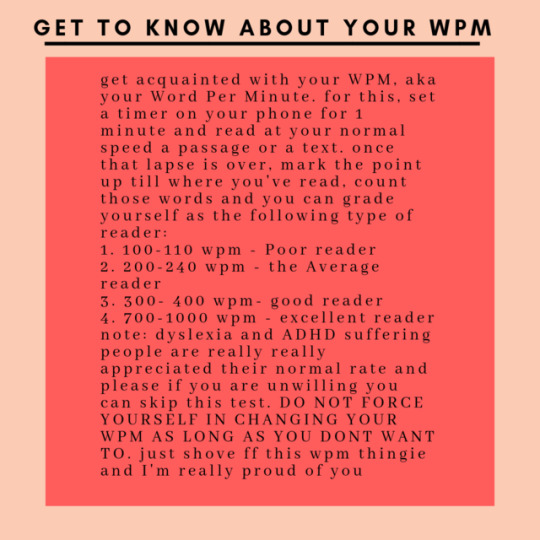
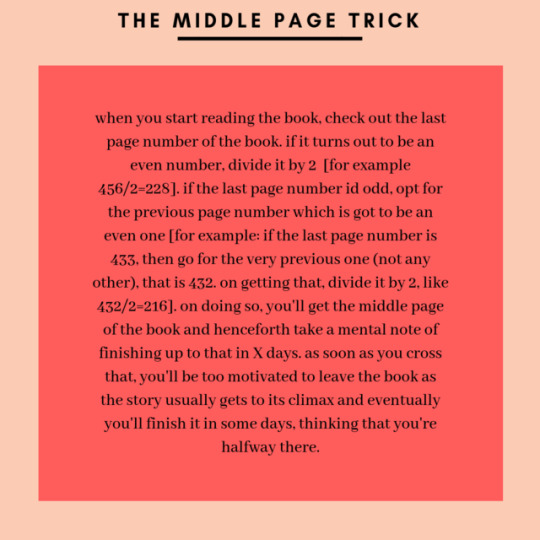
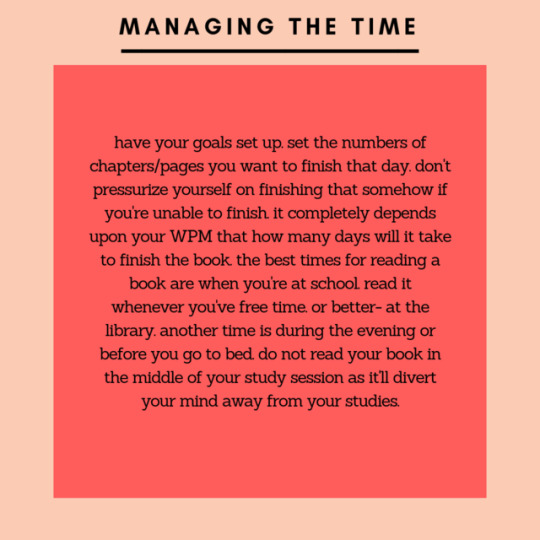
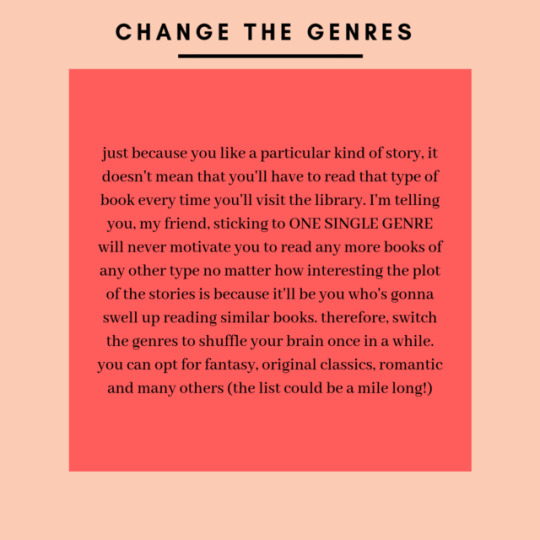
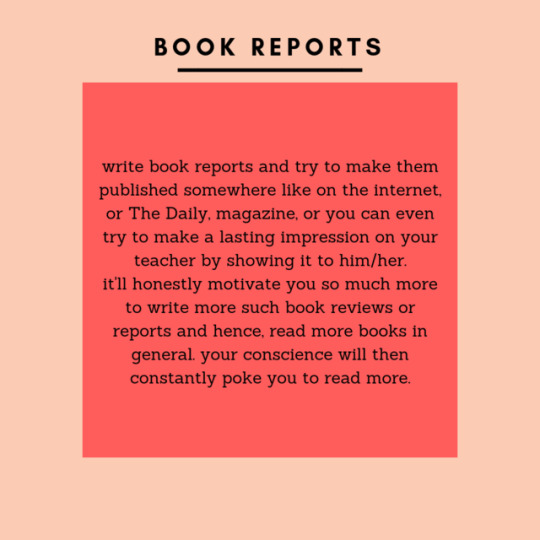
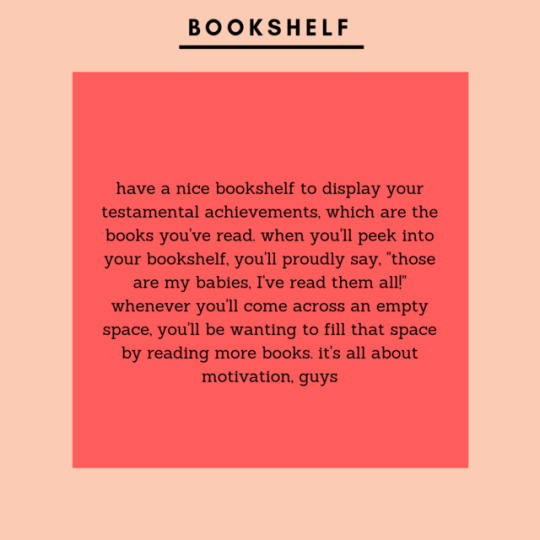
as an avid reader, I read a lot of books, but I do it in the middle of a nine to five schedule comprising of 4 two hours long after school classes, their homework, co-curricular and also 7 hours of school. so I came up with these tips to help you guys do the same.
ask me about anything literature or book related. I’ll be happy to answer
-x
#mine#heypat#prostudy#bentostudy#eintsein#therobotstudies#themousethatreads#studyquill#heysareena#heyaly#books#study#tips#mytips#masterpost#studyspo#studyblr#studywithkyungjo#scienttia
1K notes
·
View notes
Text
Writing Tip #1
See that gorgeous notebook you keep on the shelf? You’ve had it there for months, afraid to write in it, afraid to ruin it.
Guess what?
It fits perfectly into your pocket/bag/purse, so put it there along with a pen and take it with you everywhere. Watch people as they interact with each other; watch the leaves rustle on an outstretched branch while a squirrel skitters across it, and write about it.
You’ll come up with pages upon pages of crap, trust me. But in amongst all that crap, there will be gold. You’d’ve learned intricate details of the world around you, and how to capture those details with words that decorate not only a page, but the minds of those that read them.
Go ahead, ruin that notebook, and then go and pick out another. And another.
You won’t regret it.
5 notes
·
View notes
Note
Hi! I've been inspired by your reading and i finally got my first tarot deck! I've actually been interested in it for quite some time, and had used my friend's deck to do 'readings' for fun but your blog made me want to delve deeper and to have a deck on my own. Do you have any tips for beginner like me?
1. Pull a card every day and do your research on it. Use biddytarot to read up on the card’s imagery and interpretations for both the upright and reversed card. That website has the best info on the cards in my opinion.
2. Meditate on the card and see if you can discover any meanings beyond just what it means superficially. Personal symbolism is so much more important when you’re reading because your Guides/the Universe is going to communicate through the subconscious more than through the cards themselves. For instance, in terms of interpreting dreams (which are messages from the subconscious to the conscious mind), you really can’t rely on things like dream dictionaries to help you figure out what they mean because what your subconscious gives you is based on personal symbolism.
Let’s say you dreamed about a bunch of flowers. There are tons of websites that can give you meanings of flowers, but your personal symbolism might be way off. When you were a kid maybe you were picking flowers and got stung by a bee, so now, subconsciously, you associate flowers with pain and hidden danger. We all know the common symbolism of a dove representing peace, but what if at one point in time you held a bird in your hand and it shit all over you, so now ALL birds subconsciously are associated with aggravation and disgust.
See what I mean? Personal symbolism. Trust yourself to know the answer before you trust a book or a website. (but defo use those when you have absolutely no idea what it means)
3. Read for yourself first. I’ve always said this and a lot of people disagree, but everyone can read for themselves, but not everyone can read for other people. You really want to practice reading for yourself, understanding the cards, understanding the energy attached to them, learning how to apply context, and of course, developing your connection to your subconscious (and eventually unconscious) mind from your conscious mind. There’s always a good chance that you can misinterpret things and it’s better to misinterpret for yourself than it is for other people. Give yourself time to get your feet on the ground with and build up a personal connection before you worry too much about reading for other people.
4. Apply correspondences. Giving yourself as much room as possible when it comes to how many ways a card can be interpreted makes it easier for your Guides/Gods/Angels/Universe to give you straightforward answers. Learn about the suits and what they mean, numerology, the astrological correspondences - these will help you get a broader understanding of tarot cards specifically.
5. Watch other people read. Sometimes seeing people in action can give you an idea of how to go about doing it yourself. You can see the differences in readings styles - some people use spreads, some don’t. Some use one deck, some use many. Some only read for one subject, some keep it broad and general. You can learn a lot and get things flowing when you watch other people. Here’s a list of my favorite people to watch:
Estelle
Nicole Brenny
OJC Astrology
Ramblin Mike’s Tarot
RasaLilaHealing
Sarah Vrba
Soulful Revolution
CancerMoons Tarot
43 notes
·
View notes
Photo


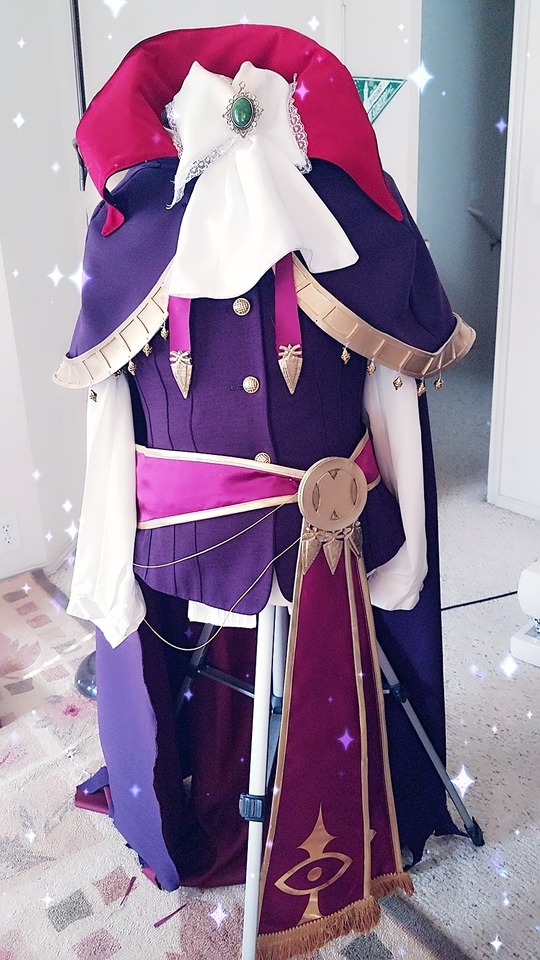

hewwoween henry is done! time to spook up ikkicon.
#fire emblem#fire emblem cosplay#fire emblem awakening#fire emblem heroes#fire emblem henry#yinyue#mytips
152 notes
·
View notes
Photo
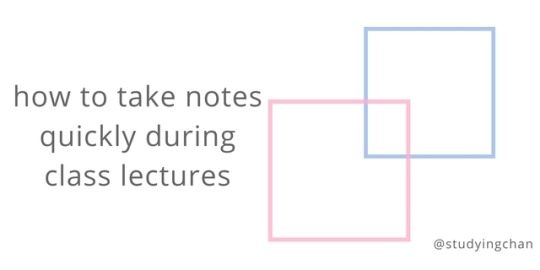
Improve your spelling
when you’re quickly writing facts, often you may come across a word which you don’t know how to spell therefore slowing you down and possibly missing key points
therefore know your spelling
if not, quickly switch from a pen to a pencil and write the word you don’t know so you can rub it out and write the correct spelling later
if spelling mistakes don’t faze you, you can just write in pen and white-out it out when you get the correct spelling
Have a strong colour coding system
what i mean by strong is…know your colours?
i have a simple colour coding system tbh
red: title and date
black: subheadings and definitions
blue: content
yellow highlighter: important information
here is more examples if you don’t like mine: 1, 2, 3, 4
Don’t be afraid to ask questions
just put your hand up
Keep a piece of paper nearby
OK THIS IS THE BEST THING I DO
when i take notes, i always keep a spare piece of lined paper next to me
why?
so when i complete the page of notes, i can continue it on the piece of paper and glue it on the bottom of my page when i’m done
so instead of writing on the next page and wasting paper, just continue it on the spare piece of paper
Use shorthand
self explanatory?
& = and
bc = because
w/ = with
WWI = World War One
∴ = therefore
#studyblr#studyspo#study tips#studyblr tips#note taking#mytips#mine#hoshi studies#ttstudys#kpopstudynet#tbhstudying#studyquill#acadehmic#snowystudiess#jenotes#emmastudies#kpop studyblr#hpstudyblr
117 notes
·
View notes
Text
Learn from my experiences from job interviews
- stand up and shake the hand of the person doing the interview when they enter. I didn't do this and it was clear that I should have. Also give a firm handshake.
- never say "um". unfortunately, while I did tell myself this beforehand, I became nervous. leave space and room for thoughts and thinking to have a clear and consise response
- ask for clarification if you do not understand the question clearly. while I did do this for one question, I assumed and did not for another and misunderstood.
- give specific answers, whether you know the answer or not from personal experience. They may ask for your problem solving techniques, strengths and weaknesses, etc.
- research and study questions and prepare responses beforehand! I did this and it worked, giving me specific answers. While I'm not perfect and did not give some answers as well as I could have, it went well in this area regardless.
- have questions in the end when or if they ask! PLEASE do not forget this part. It seemed too formal for me, and I wasn't going to go ahead with some of them, but it ended up giving me great insight to what the job entails. For example:
* What are the priorities of this position (and state the position again, for me, by stating it again they explained it in more detail).
* Ask what the uniform is! Get specific! You will know how to dress.
1 note
·
View note
Text
Organizational Systems for School

Hey guys!!!!! It’s me!!! I’m finally right back at you all with an all new organizational advice post that will make organizing for school a blast! I’m so sorry for not posting an advice post in a while! I’ve just been extremely busy trying to balance schoolwork, my new leadership position, volunteer hours, extra curriculars, and etc! I hope that you all can understand! I’ll try to post more advice post for often, but I can’t guarantee anything! I you have any questions or would like to talk to me, please visit my ask box! Anyway, if you guys don’t already know, I am doing the 100 Days of Productivity Challenge! If you would to see what I’m up to in that challenge, click here! Thank You all so much for the support, and I hope that this advice post was somewhat helpful! As always, I believe that you all can do it and I wish you all the greatest of luck this school year!
-Ben :)
Binders
Binders are probably one of the most common organizational systems here in the US! I’m not sure about other parts of the world, so if binders aren’t the most common organizational system where you live, then please share by replying to this post! Binders can be really organized as you can just flip through them, but the downside is that they can get very bulky, you have to hole punch your papers, and tons of students tend to stuff everything in the front pocket just to name a few! Anyhow, binders are a solid option for most!
Pros:
+Can be organized
+You can flip through and find papers easily
+You can hold lots of papers and even a pencil pouch!
+Many types and sizes to choose from!
Cons:
-Bulky
-Need a hole puncher/hole punched papers
-Students tend to “stuff everything” in that front plastic pocket of the binder
-The closing and opening rings thing can be annoying sometimes
-Holes from punching tend to rip on papers
Folders
Another common way of organizing is using folders! I know that a lot of people use these in addition to using binder! They are really effective, efficient, compact, and organized too! However, all lot of people tend to shove random papers in folders and they can hold that many papers for a class that has TONS of handouts!
Pros:
+Light/Compact
+Can separate classes into 2 sections
+Plastic ones tend to be super durable
+Don’t have to hole punch
Cons:
-Paper folders tear easily
-People still tend to get lazy and shove random papers in them
-Limited paper capacity
-You have to “search” the folder and can’t just flip like a binder
Expanding File Folders
You’ve probably seen these all around Tumblr! They go by many names, such as accordion files, expanding files, and much more! They are pretty uncommon, but are actually really organized, and in my opinion kind of is like a combination of a binder and folder (since there are sections like binder dividers and you just put the papers in with no rings). The really only downside is that it’s hard to find papers in it and it can can very bulky overtime! I know that Sareena from @studyign and Jasmine from @studyquill use these and love them!
Pros:
+Pretty durable
+Light/compact
+Expands and holds tons of papers
+Don’t have to hole punch
+Usually comes with labels for the tab sections
+Has different sections
Cons:
+Limited sections
+Can get bulky if you put too many papers in it
+Harder to find papers
“Hybrid Systems”
I don’t know if this actually counts as an “organizational system”, but I will include it anyway! A hybrid system is what I actually use! It’s basically is using different organizational systems together and tailoring each to your own needs! For example, I use one big binder, folders for each class, notebooks for each class, and lastly an expanding file folder to store old work! You can learn more about how I organize in my How I Stay Organized Post (although my system has changed just a pinch since the making of that post)!
Pros:
+Customizable
+Can make your own system that fit your needs
+Takes the good parts of each system and mashes it into a MEGA AWESOME SYSTEM!
+Can be super organized
+Allows you to adapt to each class for the best organizational results
Cons:
-Can be hard to maintain
-Things can get lost between all the storage devices you choose to use
-Might have to invest in a lot of stuff
Anyway, I hope that this post help you out some how! If you have any questions, but don’t be shy and stop by my ask box (I will try to answer questions when convenient!)! To see more of my study tips and advice, click here! To see my 100 Days of Productivity Challenge for this year, click here! And lastly, if you would like to see how I organize (for inspiration, etc.) for the school year, click here! THANK YOU FOR ALL THE SUPPORT GUYS!
I was inspired my Seo from @tbhstudying and Jasmine from @studyquill to do this post!
#advice post#myadvice#mytips#mypost#t#studyblr#studyspo#studyinspo#studyspiration#study inspiration#study motivation#nehrdist#zoe kezia#studyquill#heysareena#studyign#tbhstudying#studywithinspo#organization#organizing#sorryforbeingawayforsolong#my post#original#mine
269 notes
·
View notes
Text
10 tips to start to learn french
Hello ! I’ve been struggling for a long time to learn english and spanish, and I was so glad to find posts sharing tips, so I decided to do the same !
French is known as a really hard language to learn and well, I’m french so I know how much it can be tricky... To be honest, even I sometimes have trouble knowing if my sentences are right.
I work in a “lieu des littératures en scène” (literally : “place where we put literature on stage”) so I work at the heart of these issues.
The following tips apply to the french language but can be adapted to the learning of any new language, I think. In any case, give me your opinion!
____________________
1 / Understand that mistakes are not such a big deal
Of course you want to learn french the good way ! But understanding that you’re allowed to be wrong is fundamental. First, because even french people don’t know sometimes. As it’s a catchy language, we make A LOT of mistakes when we speak and when we write. Having impeccable grammar and spelling is required in some situations, like if you apply for a job or a school, and in those cases we're having our letters and resumes reread (by people who have good french skills). But obviously, when french is not your native language, people are a lot less demanding. That’s the same in any conversation : that’s easy to speak with someone who’s fluent, but if you’re not it’s not a big deal ! We know we don't pronounce some letters in our language, and we sure know it’s weird and can be disturbing. If you don’t pronounce correctly, we’ll still be able to understand what you mean. And we can even explain you what is the proper prononciation if you want to.
Also, many of our grammar rules (especially the most complicated ones to understand) are not really rules... but rather "recommendations". I like to hijack them sometimes, because some of them even exist just because of mistakes in ancient writings (so that they're not logical at all). So, try to learn them, that’s cool, but don't get too attached to them, it's not vital to follow them to the letter...
____________________
2 / Read, read, read...
I have nothing to add here. Just read in french or any language you want to learn. It’s awesome. It will improve your skills so much. At first you won’t understand anything, but hang in there. The more you will read, the more you will understand. And don’t try to translate in your head, even if it’s reaaaaally hard ! (but that’s the tip number 6...)
____________________
3 / But start with reading children's books
That’s great for a first immersion in a language. You've probably already read this advice everywhere, but it's really effective ! Be like a child, discovering new emotions, new words, new syntaxes... Illustrations are great to understand the meaning and the emotions behind the sentences though. Here are two great websites where you can find free children’s books online :
Whisperies : it’s specially made for children with dyslexic troubles, so the syllables are decomposed and the silent letters are greyed out (super cool for learning !)
Storyweaver : stories are classified by level, and you can chose the language !
____________________
4 / Work on your vocabulary...
Having a notebook dedicated to vocabulary will help a lot. You can, for exemple, try to learn a new word a day, or regularly. Come back to it, write some comments, use colors to help you... Make it your own ! Plus, writing down words can really help to memorize...
____________________
5 / Categorize
For a more effective vocabulary learning, categorize ! It’s not necessary to learn a bunch a words you’ll never use juste to learn : you're just gonna confuse your mind. For instance, you can focus on the family vocabulary the first week and learn two new words a day, or a word and its synonyms a day... Don’t forget to write them down in your vocabulary notebook !
____________________
6 / Don’t translate !
It’s important not to try to translate ! Desperately trying to translate can be very tricky... Either because some words or sentences are not translatable, or because it will take a lot of energy from you. Try to learn like a child : start from scratch. Each language has its own rules, even if it can look alike. Immerse in the syntaxe, in the grammar, try to understand it instead of applying the rules of your native language, because it's bound to mislead you...
____________________
7 / Watch series, movies, tv...
That’s the most obvious piece of advice, but it’s actually a very good one ! Watch a movie, youtube videos you like or a tv show you know by heart and just change the language and the subtitles. An old roommate of mine worked on many languages by watching all the Friends seasons again and again ! You can start with the subtitles in your native language, or the sound in your native language and the subtitles in the language you want to learn... There are many possibilities to make your knowledge evolve !
____________________
8 / Take classes
Yes. That’s it. Sign up for classes. A professor can sure help you more than tumblr posts... Meet natives, meet learners like you, join workshops, meetings... Speak with others, challenge yourself, take tests to see your evolution and tou have access to new skills and knowledge...
____________________
9 / Learn from your mistakes
Everyone has their weaknesses... You probably know that, in any field, the difficult things to understand are different for everyone. In language, that’s the same ! Maybe you’ll struggle with accents, with conjugation or with some grammar rules... And that’s ok. Again : everyone has their weaknesses. The most important thing is to spot them and learn from them. When you understand you made a mistake, write it down, and come back to it later. If you know what you have to work on, it will be easier later, I promise...
____________________
10 / Enjoy it !
It may be the most important tip here... If learning makes you suffer, stop it. I’m serious. Find something else. Learning languages is great, but there is no need to suffer for that. You NEED to enjoy it. Because it’s so damn good to be able to express yourself in another language than your native one... It can be difficult, but don’t do it if it’s painful. Nothing deserves that you get hurt. If you have trouble with school, a school phobia, dyslexic disorder or anything, approach your doctor to discuss it and come up with a solution.
____________________
Let me know if this was useful (or not !) and if you want more posts like this :) I love that.
I’m sorry again for my english, don’t hesitate to let me know if you spot mistakes, I’m happy to learn from them ;)
See you soon, love
6 notes
·
View notes
Text
Dos And Don’ts Of Dialogue
Dialogue: either you’re great at it, or it’s your worst nightmare. Writing dialogue can be difficult, confusing, and frustrating. Here are some tips to clear the air when it comes to dialogue!
DON’T overuse dialogue tags

From the very beginning, writers are often told not to overuse “said”. While this is sound advice, it can create the false notion that “said” is never to be used. This simply isn’t true!
Stay away from repeating creative dialogue tags one after another, especially if it’s redundant. For example, if there’s an exclamation point after a sentence, you don’t need to say that the character exclaimed or yelled.
Often, a dialogue tag isn’t even needed. Just end the dialogue without a tag.
DO use “said”

Repeat after me: IT IS OKAY TO USE “SAID”!
I’m guilty of this one as well. The urge to not use “said” too often becomes a habit of never using it and replacing it with unnecessary dialogue tags.
Just use said! It will make your writing seem far more mature than if you used something like “growled” or “stated”.
DON’T go on tangents

Dialogue should be realistic. If you have a character that is known for going off on tangents, then by all means do so. If you’re going on a tangent to seem “artistic”, you might want to cut it off there.
My biggest pet peeve with modern young adult literature is that writers try to combing their need to prove they can write beautiful prose with dialogue. Don’t. In the end, it’s just unrealistic and a cheap way of trying to show your talent. Leave the long-winded metaphors for your narration, please.
DO use unique speech

Everyone speaks differently. This could mean accents, slang, catchphrases, or misused words. Include this in your dialogue!
Colorful dialogue creates colorful characters, and allows the reader to be able to easily distinguish who is speaking (without dialogue tags!).
DON’T overuse phonetics

Though accents can be a great way to create colorful dialogue, phonetically spelling every word according to the character’s accent can get annoying fast. Stick to spelling out the most important words. After a while, the reader should be able to read that character’s dialogue with their accent in mind anyway.
DO show, not tell
Every writer has received this advice at one point or another, but with good reason. Dialogue is the best way to put “show, don’t tell” into practice. However, writers often think that dialogue itself counts as showing. Though dialogue is a better tool than description in these instances, it doesn’t completely serve as a way to show on its own.
Telling: “Hey, calm down. You look nervous.”
Showing: “Hey, calm down. You haven’t stopped tapping your foot since we got here.”
DON’T repeat names too often
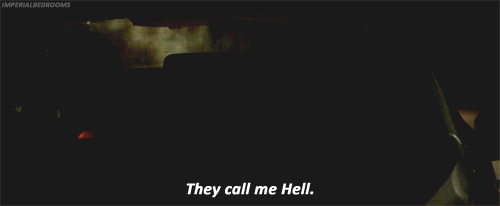
I too fall into the trap of constantly clarifying who is speaking. When you’re writing, it feels natural to say things like “’How are you doing, Jim?’ ‘I’m doing well, Pam.’”, but the reality is that no one speaks like that, especially to people they’re close to.
Most of the time, you should use names in dialogue tags and greetings. Otherwise, use names sparingly.
#writing#writer#writers#writeblr#writing tips#mytips#writing help#dialogue#oc#ocs#wip#wips#the office#rapunzel#parks and rec#drag race
8K notes
·
View notes
Text
how to get better grades in online school
hi!! ok so here’s my first masterpost! i have a youtube video of this already so if you don’t want to read words you can check it out! my yt videos are probably more entertaining but written masterposts are faster to read so idk pick your poison
ok anyway!! welcome to -

some background info: i took online geometry sem 1 over the summer and accumulated ten tips. for credibility, i got 98% overall at the end of the course without any retakes (hopefully i’m not coming off as bragging but this is just to show that these tips are helpful). ok let’s get started!
work ahead! in online school, you’re able to work ahead as much as you want, so use that to your advantage! plus you never know what might happen in the future. for example: if i get really busy or something, then i don’t have to worry as much because since i’m already ahead in online school, i have one less thing to stress over about!
get books to help you! i checked out two geometry books from the library and i would read over them before tests and stuff. it provides another source of learning and it’s better to read information from different formats with different explanations by different authors! if you do, then you’ll remember the information better:)
ask online teachers if you have questions! if you’re in online school, there are probably most likely online teachers available a few hours every day. if you’re confused with anything, confide in those teachers! they’re there for a reason.
use the internet! this is pretty self-explanatory but yeah it’s sort of like the “get books to help you” thing; it provides a different source of information so you can remember info better. plus, if you’re confused, you can always use google!
work with friends who are also in online school! i had a few friends that were taking online geometry as well. whenever i had questions or concerns and was too afraid to consult teachers, i would ask my friends! (yes i’m a wimp.) if you have friends in online school, support each other! online school is less scary and stressful if you know there’s someone suffering alongside you :^)
make a schedule! my online course had this calendar that would show me what lessons i needed to complete each day in order to finish my course on time. that was super helpful. if you don’t have something like that, make one yourself! you can use your bullet journal, your planner, a whiteboard, whatever. just make sure you plan it out!
work a bit every day! working one hour every day beats working seven hours on, say, only one day of the week. it’s better for your brain, your memory, your health, and your sanity
keep notes! my online course would give me a study guide for every lesson, which was pretty helpful. however it wasn’t quite enough, so i would make flashcards using an iphone app called brainscape based on what i didn’t think i would remember. then i would study them and remember them. yayyy
have a good workspace! a tranquil area like your bedroom is much better than a loud area like the tv room. it helps you concentrate while you’re studying and thus helps you remember information better!
don’t slack off! just because there’s no teacher to yell at your face when you don’t do your work for a day doesn’t mean that you should be lazy. online school is just as hard if not harder than in-person public school. thus, keep at it and work every day and do your best!!
thanks so much for reading! if you have any constructive criticism, please let me know. i hope you guys took something out of this!
x kathie
-
08.15.17
#studyblr#studyspo#mine#mytips#mymasterposts#online school#school#online learning#studyign#tbhstudying#studyquill#tips#studytips#online school tips#how to get better grades#online school advice#studyblr community#new studyblr#masterpost#onlineschooltips
729 notes
·
View notes
Text
Hack your brain into not being overwhelmed by your to-do list
So you know how the advice goes that you should split up large projects into the smallest possible steps? You know what that leaves you with? Yeah, a huge-ass list of tasks that are still ahead of you. Might be a little discouraging if you’re anything like me.
Solution: Make the list. Then, put the list away. Well, no, first get another sheet of paper. Label it CURRENT TASK at the top. Pick ONE task from your list that you’re going to do right now and write it down. THEN you can put the list away, and don’t look at it again. Leave the sheet of paper on your desk, next to your materials/laptop. That’s your focus now. If you glance at it while working, ask yourself: is that what I’m currently doing? If the answer is no, stop what you’re doing. You can do that later. Finish that one task first.
When that’s done, you can cross it off, and put the next task under it. That way, you won’t have the mountain of work that’s yet to be done looming over you, but instead you’ll have this nice list of shit you already got done. Ain’t that a nice feeling?
#studyblr#study tips#txt#mytips#works well for projects that span multiple weeks like term papers#you won't get all of it done today so why look at the entire list today#nah mate
66 notes
·
View notes